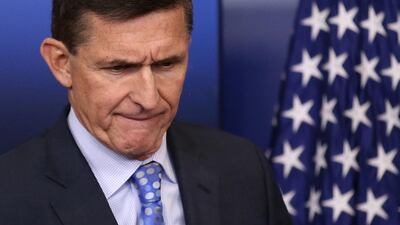WASHINGTON // President Donald Trump’s embattled national security adviser Michael Flynn resigned on Monday following reports that he had misled vice president Mike Pence and other officials about his contacts with Russia. His departure upends Mr Trump’s senior team after less than a month in office.
In a resignation letter, Mr Flynn said he held numerous calls with the Russian ambassador to the US during the transition and gave “incomplete information” about those discussions to Mr Pence. The vice president, apparently relying on information from Mr Flynn, initially said the national security adviser had not discussed sanctions with the Russian envoy, although Mr Flynn later conceded the issue may have come up.
Mr Trump named retired Lt Gen Keith Kellogg as the acting national security adviser. Lt Gen Kellogg had been appointed the national security council chief of staff and advised Mr Trump on national security issues during the campaign.
The justice department warned the Trump administration weeks ago that contradictions between the public depictions and the actual details of the calls could leave Mr Flynn in a compromised position, an administration official and two other sources said on Monday.
One said the justice department alerted the White House there was a discrepancy between what officials were saying publicly about the contacts and the facts of what had occurred. Mr Pence – apparently relying on information from Mr Flynn – initially said sanctions were not discussed in the calls, although Mr Flynn has since told White House officials that the topic may have come up.
A second official said the justice department was concerned Mr Flynn could be in a compromised position as a result.
The White House has been aware of the justice department warnings for “weeks”, an administration official said, although it was unclear whether Mr Trump and Mr Pence had been alerted.
Mr Flynn apologised to Mr Pence last week, following a Washington Post report asserting that the national security adviser has discussed sanctions with the Russian envoy.
White House spokesman Sean Spicer said Mr Trump was consulting with Mr Pence on Monday about his conversations with the national security adviser. Asked whether the president had been aware that Mr Flynn might discuss sanctions with the Russian envoy, Mr Spicer said, “No, absolutely not.”
Mr Trump, who comments on a steady stream of issues on his Twitter feed, has been silent about the matter since The Washington Post reported last week that Mr Flynn had discussed sanctions with the Russian envoy.
A US official said Mr Flynn was in frequent contact with ambassador Sergey Kislyak on the day the Obama administration laid sanctions on Russia for election-related hacking, as well as at other times during the transition.
Mr Flynn’s discussions with the Russian raised questions about whether Mr Flynn offered assurances about the incoming administration’s new approach. Such conversations would breach diplomatic protocol and possibly violate the Logan Act, a law aimed at keeping citizens from conducting diplomacy.
Earlier on Monday, White House aide Kellyanne Conway said Mr Trump had “full confidence” in Mr Flynn, although her assertions were not backed up by other senior Mr Trump aides. Mr Spicer would say only that Mr Flynn was continuing to carry out “his daily functions”.
Amid the uncertainty over Mr Flynn’s future, several of the president’s top advisers, including chief of staff Reince Priebus and counsel Don McGahn, ducked in and out of late-night meetings in the West Wing.
Several house Democrats called on oversight committee chairman Jason Chaffetz, a Republican from Utah, to launch an investigation into Mr Flynn’s ties to Russia.
House Democratic leader Nancy Pelosi called for Mr Flynn to be fired, saying he “cannot be trusted not to put Putin before America”.
Republican senator Susan Collins of Maine said that if Mr Pence were misled, “I can’t imagine he would have trust in Gen Flynn going forward.” She said it would also be “troubling” if Mr Flynn had been negotiating with a foreign government before taking office.
The controversy comes as Mr Trump and his leading advisers seek to steady the White House after a rocky start. The president, who seeks input from a wide range of business associates, friends and colleagues, has been asking people their opinions on his senior team, including Mr Spicer and Mr Priebus.
Advisers have privately conceded that the White House spat out too many disparate messages in the first few weeks, though they also note that the president’s own tweets sometimes muddy the day’s plans before most of the White House staff has arrived for work.
Mr Flynn sat in the front row of Mr Trump’s news conference with Canadian prime minister Justin Trudeau on Monday. The president did not take a question about Mr Flynn’s future from two reporters who were called upon, and he ignored journalists’ shouted follow-up inquiries as he left the room.
Over the weekend, Mr Trump told associates he was troubled by the situation, but did not say whether he planned to ask Mr Flynn to step down, according to a person who spoke with him recently. Mr Flynn was a loyal Mr Trump supporter during the campaign, but he is viewed skeptically by some in the administration’s national security circles, in part because of his ties to Russia.
In 2015, Mr Flynn was paid to attend a gala dinner for Russia Today, a Kremlin-backed television station, and sat next to Russian president Vladimir Putin during the event.
Mr Flynn spoke with the vice president about the matter twice on Friday, according to an administration official. The official said Mr Pence was relying on information from Mr Flynn when he went on television and denied that sanctions were discussed with Mr Kislyak.
The White House is also dealing with fallout from the rocky rollout of Mr Trump’s immigration executive order, which has been blocked by the courts. The order was intended to suspend the nation’s refugee program and bar citizens of seven Muslim-majority countries from entering the United States.
* Associated Press

